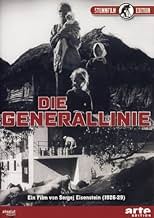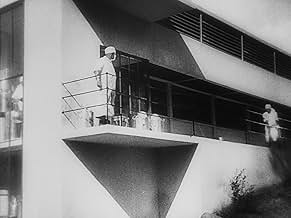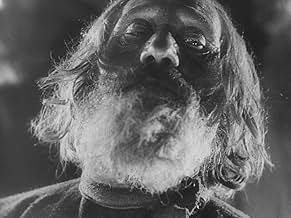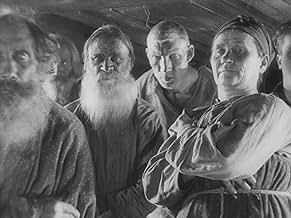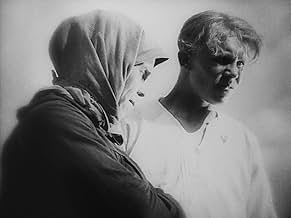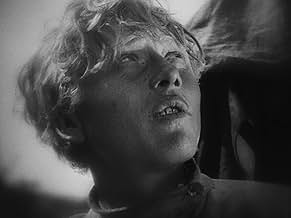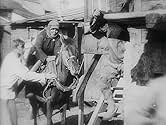PUNTUACIÓN EN IMDb
7,2/10
1,8 mil
TU PUNTUACIÓN
Añade un argumento en tu idioma100.000.000 peasants - illiterate, poor, hungry. There comes a day when one woman decides that she can live old life no longer. Using ways of new Soviet state and industrial progress she cha... Leer todo100.000.000 peasants - illiterate, poor, hungry. There comes a day when one woman decides that she can live old life no longer. Using ways of new Soviet state and industrial progress she changes life and labor of her village.100.000.000 peasants - illiterate, poor, hungry. There comes a day when one woman decides that she can live old life no longer. Using ways of new Soviet state and industrial progress she changes life and labor of her village.
- Dirección
- Guión
- Reparto principal
- Premios
- 1 premio en total
Reseñas destacadas
I took out this movie from the College library to help write a research paper on collectivization in Stalins Russia. It was actually quite good in that it depicted the hardships of peasants in that era. It is also a good representation of the propaganda that Stalin used in order to trick the peasants into becoming collectivized. I think it is a good film for anyone to view and it's especially beneficial for those trying to get an understanding of historical Russia and peasant life. Beware though, don't be tricked by what you see! Collectivization was not such a positive thing, many people were killed during the processes of dekulakization and others were faced with economic hardships due to shortages and quotas. Overall it is a good propaganda film and is historically significant!
Due to some common interests between German and Russian aristocracy ( the Russians even had aristocrats in their past not to mention they had an Empress called Catherine the Great, as great as this German count's heiresses
), it is not strange that this Teutonic count has understood and even enjoyed Herr S. M. Eisenstein's "Staroye I Novoye".
It is not very usual that for the aristocracy to enjoy Bolshevist films full of proletarian demands that put private property at risk or as it happens in this case, a film about the Communist Party's policy on the subject of the collectivization of the Soviet agriculture. Normally this would be perfect gibberish for this German count, but thanks to Herr Eisenstein 's greatness and directorial talent, the hardships of the heroine of the film, Dame Marfa ( Dame Marfa Lapkina ) breached even the thick aristocratic Schloss walls.
And that's one of the first remarkable aspects of this oeuvre; in spite of the political subject of the film, the powerful images and lyricism ( astonishing and beautiful shot compositions ), especially during the first part of the movie, preserve the artistic merits entirely while serving a propaganda purpose. The second remarkable aspect of the film is the dichotomy between the old and new, the fight to improve the lot of Dame Marfa and her countrymen. There are many discussions because it is not easy even in Russia to change ancient and conservative customs. There are superb metaphors and social criticism ( illiteracy, bureaucracy, religiosity ) which perfectly fit the film, and last but not least, "Staroye I Novoye", is a kind of archaic documentary about ancient customs established deeply in old Russia, those ones that our heroine must fight against. And there is also a lot about agriculture ( very enlightening for this German count), especially about harvesting and how to fatten Russian cows or pigs ( literally, no pun here ).
Herr Eisenstein had to bear during the last era of his film career, unbelievable censorship and mutilation of his work, as happens with "Staroye I Novoye". The film was reedited and Eisenstein accused of sympathizing with Trostky's policies but fortunately the film was restored and showed by the German-frenchified t.v. channel "ARTE", natürlich!, including an evocative music score by Herr Taras Bujewski, that fits superbly Herr Eisenstein primal artistic interests.
And now, if you'll allow me, I must temporarily take my leave because this German Count must buy a tractor for one of his Teutonic heiress.
Herr Graf Ferdinand Von Galitzien http://ferdinandvongalitzien.blogspot.com/
It is not very usual that for the aristocracy to enjoy Bolshevist films full of proletarian demands that put private property at risk or as it happens in this case, a film about the Communist Party's policy on the subject of the collectivization of the Soviet agriculture. Normally this would be perfect gibberish for this German count, but thanks to Herr Eisenstein 's greatness and directorial talent, the hardships of the heroine of the film, Dame Marfa ( Dame Marfa Lapkina ) breached even the thick aristocratic Schloss walls.
And that's one of the first remarkable aspects of this oeuvre; in spite of the political subject of the film, the powerful images and lyricism ( astonishing and beautiful shot compositions ), especially during the first part of the movie, preserve the artistic merits entirely while serving a propaganda purpose. The second remarkable aspect of the film is the dichotomy between the old and new, the fight to improve the lot of Dame Marfa and her countrymen. There are many discussions because it is not easy even in Russia to change ancient and conservative customs. There are superb metaphors and social criticism ( illiteracy, bureaucracy, religiosity ) which perfectly fit the film, and last but not least, "Staroye I Novoye", is a kind of archaic documentary about ancient customs established deeply in old Russia, those ones that our heroine must fight against. And there is also a lot about agriculture ( very enlightening for this German count), especially about harvesting and how to fatten Russian cows or pigs ( literally, no pun here ).
Herr Eisenstein had to bear during the last era of his film career, unbelievable censorship and mutilation of his work, as happens with "Staroye I Novoye". The film was reedited and Eisenstein accused of sympathizing with Trostky's policies but fortunately the film was restored and showed by the German-frenchified t.v. channel "ARTE", natürlich!, including an evocative music score by Herr Taras Bujewski, that fits superbly Herr Eisenstein primal artistic interests.
And now, if you'll allow me, I must temporarily take my leave because this German Count must buy a tractor for one of his Teutonic heiress.
Herr Graf Ferdinand Von Galitzien http://ferdinandvongalitzien.blogspot.com/
...from directors Sergei Eisenstein and Grogoriy Aleksandrov. When peasant farm woman Marfa (Marfa Lapkina) is driven to the edge of ruin by the old way of farming, she decides to join other fed up agriculturalists and form a collective farm, working together for a better common future. But the enemies of progress are always at their heels: the fat capitalists, the false-hope Church, and a lazy bureaucracy.
We all know how the Soviet collectivist farming utopia really turned out, and when the lecturing sections of the film are at the forefront it's a tedious bore. But when the directors let their artistic instincts come into play, there's a lot to enjoy here. The visual compositions are often interesting and aesthetically pleasing, and I liked a scene where one farmer dreams of the skies raining milk and cream, and another scene with a new tractor hauling a train of wagons like some kind of centipede over the hills.
The filmmakers also gathered a lot of interesting faces, and use a lot of close-ups. Beauty is not the order of the day, and it almost seems like some of Fellini's later period grotesqueries. I also don't recall a movie featuring so many people with roaches crawling on them. This won't be for many viewers, but for those who appreciate the value of technique and composition, this is recommended.
We all know how the Soviet collectivist farming utopia really turned out, and when the lecturing sections of the film are at the forefront it's a tedious bore. But when the directors let their artistic instincts come into play, there's a lot to enjoy here. The visual compositions are often interesting and aesthetically pleasing, and I liked a scene where one farmer dreams of the skies raining milk and cream, and another scene with a new tractor hauling a train of wagons like some kind of centipede over the hills.
The filmmakers also gathered a lot of interesting faces, and use a lot of close-ups. Beauty is not the order of the day, and it almost seems like some of Fellini's later period grotesqueries. I also don't recall a movie featuring so many people with roaches crawling on them. This won't be for many viewers, but for those who appreciate the value of technique and composition, this is recommended.
This is a very conscious change in direction from Eisenstein and his codirector Grigori Aleksandrov. Eisenstein's first three films (including October: Ten Days that Shook the World which was also codirected by Aleksandrov) had no main characters. They barely had characters at all. Well, now, in The General Line, the entire film revolves around one character, a woman farmer. The pair do not remove themselves from the propaganda, but they do change what they're propagandizing for. The former were for revolution directly. This is for acceptance of the new Soviet farming system as better, more efficient, more technologically advanced, and more wealth-generating than any other system available (mostly the old, Tsarist feudal system).
Martha (Martha Lapkina) lives in rural Russia after the fall of the Tsar, and she watches the family farm split into parts upon the death of her father, most going to her two brothers. She has a vision, though, and that vision is the kolkhoz, the Soviet communal farms that will lead to progress. Against her are the old orders, mostly exemplified by the Orthodox Church and the old land owners, the kulaks, the second lowest of the old system who were now the highest of the new before the Soviets could fix things. That progress goes through the arrival of a milk separator that eases the labor of turning milk into cream, the purchase of a bull to make the farm a bovine commune, and the purchase of a tractor to ease the labor in the fields.
Each event is effectively a short film on its own with its own ebbs and flows, one of the reasons why the film doesn't work quite as well as something like Battleship Potemkin. However, the individual sequences are really masterclasses in Eisenstein's editing. The standout is probably the separator sequence. The farmers, including Martha, are introduced to this new machine by the local commissar (Ivan Yudin), and we watch as the farmers give up some of their milk to this unknown machine. It slowly works, the commissar turning the gear over and over with Eisenstein cross-cutting all over the place to build tension, until the two dispensing tubes start releasing the cream and the milk, separated with much less waiting than the old process was. Technological progress, the new, wins over the old.
The most dominant display of the old, in my mind, is a religious procession. The farmers remain in the middle of the road as the religious parade icons of religious figures directly over them, Eisenstein making it obvious that the Church considers itself more than the people who degrade themselves before it. The procession goes to a hill where the chief priest promises a miracle which he times with a cloud which allows him to surreptitiously do some stuff, but Martha looks up and sees the deception, informing her of the emptiness of religion. All she has is the collective.
She faces different challenges in her efforts, and I found these...curious. Some of them make perfect sense from the perspective of the needs of Soviet propaganda, mostly around the kulaks poisoning the bull. However, the two biggest hurdles for the Soviet collective farm in the latter parts of the film are parts of the...Soviet future. The first is the bureaucracy itself which is a slow-moving machine that does not want to move with any energy in approving their purchase for a tractor (that they have to get permission to buy a tractor is an obvious irony that the film makes no notice of, of course). I mean...this is the most direct and largest portrait that the movie makes of the Soviet state itself...and it needs to be shamed into action. Gonna be honest, I'm shocked this made it to the final cut.
The final thing is the tractor itself. A product of the great Soviet industrial machine, it's presented in the most glamorous terms when it is brought to the farm to be driven by a well-dressed young man (Konstantin Vasilyev). The tractor...immediately breaks down. The young man has to take it apart and fix it, and Martha helps him. Now, there are symbolic things all around this (the farmer and the industry coming together for Russia, the young man shedding his fancy dress for more rural appropriate attire, the people collectively being the power of Russia type stuff), but the larger image is still there: the new Soviet tractor immediately broke down. That's...so bizarre. It's so bizarre that it almost feels satirical, but it can't be. If it survived Soviet censorship, then no one saw it that way.
Anyway, the individual sequences are where the film is the most enjoyable. They just don't connect as well as they should. The middle section, which is essentially just a dream Martha has of a working factory farm, goes on for so long and is such a departure from the actual narrative that my interest just waned tremendously. However, by keeping it to the middle and backloading the film with the most dramatic bits with the tractor helps elevate the depression made by that middle section.
So, Eisenstein shows that he's most interesting in this period as the creator of sequences. I'm honestly not sure what Aleksandrov brings to the production (online there doesn't seem to be much of any information about how they divided any directing responsibilities), but considering he's mostly known for things like musicals of the early sound period, I'd suspect he had a greater hand in the miniatures and larger physical production elements than Eisenstein did. The overall product is interesting and somewhat entertaining. The individual sequences are tours-de-force. The focus on a central character gives the audience something more than general adherence to communist principles to latch onto (she even gets a wedding by the end, which is nice). I think I'm most interested in the film as a look at a different culture, though: 1920s rural Russia.
In some ways, this is my favorite of Eisenstein's silent films, but it's also his least in some other ways.
Martha (Martha Lapkina) lives in rural Russia after the fall of the Tsar, and she watches the family farm split into parts upon the death of her father, most going to her two brothers. She has a vision, though, and that vision is the kolkhoz, the Soviet communal farms that will lead to progress. Against her are the old orders, mostly exemplified by the Orthodox Church and the old land owners, the kulaks, the second lowest of the old system who were now the highest of the new before the Soviets could fix things. That progress goes through the arrival of a milk separator that eases the labor of turning milk into cream, the purchase of a bull to make the farm a bovine commune, and the purchase of a tractor to ease the labor in the fields.
Each event is effectively a short film on its own with its own ebbs and flows, one of the reasons why the film doesn't work quite as well as something like Battleship Potemkin. However, the individual sequences are really masterclasses in Eisenstein's editing. The standout is probably the separator sequence. The farmers, including Martha, are introduced to this new machine by the local commissar (Ivan Yudin), and we watch as the farmers give up some of their milk to this unknown machine. It slowly works, the commissar turning the gear over and over with Eisenstein cross-cutting all over the place to build tension, until the two dispensing tubes start releasing the cream and the milk, separated with much less waiting than the old process was. Technological progress, the new, wins over the old.
The most dominant display of the old, in my mind, is a religious procession. The farmers remain in the middle of the road as the religious parade icons of religious figures directly over them, Eisenstein making it obvious that the Church considers itself more than the people who degrade themselves before it. The procession goes to a hill where the chief priest promises a miracle which he times with a cloud which allows him to surreptitiously do some stuff, but Martha looks up and sees the deception, informing her of the emptiness of religion. All she has is the collective.
She faces different challenges in her efforts, and I found these...curious. Some of them make perfect sense from the perspective of the needs of Soviet propaganda, mostly around the kulaks poisoning the bull. However, the two biggest hurdles for the Soviet collective farm in the latter parts of the film are parts of the...Soviet future. The first is the bureaucracy itself which is a slow-moving machine that does not want to move with any energy in approving their purchase for a tractor (that they have to get permission to buy a tractor is an obvious irony that the film makes no notice of, of course). I mean...this is the most direct and largest portrait that the movie makes of the Soviet state itself...and it needs to be shamed into action. Gonna be honest, I'm shocked this made it to the final cut.
The final thing is the tractor itself. A product of the great Soviet industrial machine, it's presented in the most glamorous terms when it is brought to the farm to be driven by a well-dressed young man (Konstantin Vasilyev). The tractor...immediately breaks down. The young man has to take it apart and fix it, and Martha helps him. Now, there are symbolic things all around this (the farmer and the industry coming together for Russia, the young man shedding his fancy dress for more rural appropriate attire, the people collectively being the power of Russia type stuff), but the larger image is still there: the new Soviet tractor immediately broke down. That's...so bizarre. It's so bizarre that it almost feels satirical, but it can't be. If it survived Soviet censorship, then no one saw it that way.
Anyway, the individual sequences are where the film is the most enjoyable. They just don't connect as well as they should. The middle section, which is essentially just a dream Martha has of a working factory farm, goes on for so long and is such a departure from the actual narrative that my interest just waned tremendously. However, by keeping it to the middle and backloading the film with the most dramatic bits with the tractor helps elevate the depression made by that middle section.
So, Eisenstein shows that he's most interesting in this period as the creator of sequences. I'm honestly not sure what Aleksandrov brings to the production (online there doesn't seem to be much of any information about how they divided any directing responsibilities), but considering he's mostly known for things like musicals of the early sound period, I'd suspect he had a greater hand in the miniatures and larger physical production elements than Eisenstein did. The overall product is interesting and somewhat entertaining. The individual sequences are tours-de-force. The focus on a central character gives the audience something more than general adherence to communist principles to latch onto (she even gets a wedding by the end, which is nice). I think I'm most interested in the film as a look at a different culture, though: 1920s rural Russia.
In some ways, this is my favorite of Eisenstein's silent films, but it's also his least in some other ways.
Technically, in some ways "Old and New" is a good film. After all, this Grigori Aleksandrov and Sergei M. Eisenstein production has the sort of nice cinematography you might expect from an Eisenstein film. Plus, it has lots of 'faces'--unusual looking folks whose piercing visages seem almost like the folks you'd later find in a Fellini film. However, it also has an incredibly broad message--lacking all subtlety and humanity. Folks in this film are simply tools for Soviet propaganda and the writing is quite poor.
Little did most folks realize at the time, but the film also served to justify the deaths of millions of farmers! This, I'm sure, I'll need to explain a bit. Back in 1928, the Soviet government (and increasingly, this meant Stalin) felt that farm production was a problem due, in part, to the old pre-communism days. Instead of the inefficient individual farms (shown being run by nothing but fat and greedy people in this film), it would be much better if small farmers all banded together to make larger farms where no one owned the land, equipment or output--it all belonged to the collective (and the Soviet government). So, independent farmers were increasingly sent off to gulags in Siberia or were simply thrown off the land to starve to death. The same fate was meted out to the priests--who, in this film, are evil, superstitious and lead the people astray. Oddly, in spite of all these enemies of the State being punished, production actually went down-- though you see none of this in the film! Soon, it was assumed that folks in the collective were lazy, and starting in the early 1930s, these folks met similar fates in many cases. This film helped lay the groundwork for a program that killed between 4-10,000,000 people by most estimates! Rarely has a film been responsible, in part, for more death and evil than "Old and New".
If it was't for the evil that this film justified, it STILL would be shallow propaganda...with nice cinematography. But clearly, its message is meted out in an almost cartoon-like fashion and I think this film is really overrated.
Little did most folks realize at the time, but the film also served to justify the deaths of millions of farmers! This, I'm sure, I'll need to explain a bit. Back in 1928, the Soviet government (and increasingly, this meant Stalin) felt that farm production was a problem due, in part, to the old pre-communism days. Instead of the inefficient individual farms (shown being run by nothing but fat and greedy people in this film), it would be much better if small farmers all banded together to make larger farms where no one owned the land, equipment or output--it all belonged to the collective (and the Soviet government). So, independent farmers were increasingly sent off to gulags in Siberia or were simply thrown off the land to starve to death. The same fate was meted out to the priests--who, in this film, are evil, superstitious and lead the people astray. Oddly, in spite of all these enemies of the State being punished, production actually went down-- though you see none of this in the film! Soon, it was assumed that folks in the collective were lazy, and starting in the early 1930s, these folks met similar fates in many cases. This film helped lay the groundwork for a program that killed between 4-10,000,000 people by most estimates! Rarely has a film been responsible, in part, for more death and evil than "Old and New".
If it was't for the evil that this film justified, it STILL would be shallow propaganda...with nice cinematography. But clearly, its message is meted out in an almost cartoon-like fashion and I think this film is really overrated.
¿Sabías que...?
- ConexionesEdited into Que Se Salve Quien Pueda (La Vida) (1981)
Selecciones populares
Inicia sesión para calificar y añadir a tu lista para recibir recomendaciones personalizadas
Detalles
- Duración2 horas 1 minuto
- Color
- Mezcla de sonido
- Relación de aspecto
- 1.33 : 1
Contribuir a esta página
Sugerir un cambio o añadir el contenido que falta

